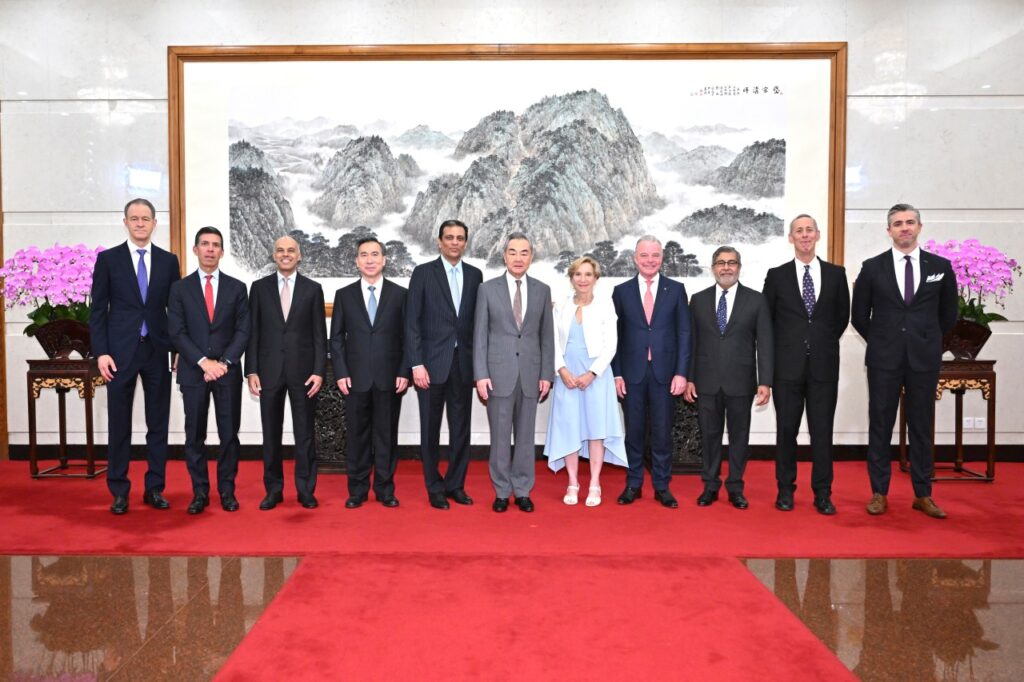
In this photo released by Xinhua, China's Foreign Minister Wang Yi (sixth from left) poses with a U.S. business delegation that includes FedEx CEO Raj Subramaniam (fifth from left) and Chinindex CEO Roberta Lipson (fifth from right), in Beijing, Monday, July 22, 2024. Chinese officials have told the visiting top U.S. delegation that higher tariffs on Chinese imports will hurt business in the country. Meanwhile, China's Communist Party has vowed to improve the business environment for foreign investors. (Yue Yuewei/Xinhua via The Associated Press)
BANGKOK (AP) — Chinese officials warned a delegation of top U.S. businesses visiting Beijing this week that raising tariffs on Chinese imports would hurt business activity in the country.
The delegation of powerful business leaders from the U.S.-China Business Council, including the CEOs of FedEx and Micron, came after top-level meetings last week in which ruling Communist Party leaders approved a policy blueprint with numerous pledges to improve the business environment for foreign investors. But they also vowed to be more vigilant about protecting state secrets, a potential danger zone for foreign companies that face increased scrutiny from authorities for doing business in China.
Both the United States and China have imposed trade and investment restrictions citing national security concerns, sometimes finding American companies caught in the middle: Beijing vehemently opposes U.S. moves to raise tariffs on Chinese goods and restrict Chinese access to advanced technologies, such as cutting-edge computer chips used in artificial intelligence.
President Joe Biden's administration has sought to improve ties with China, including several meetings between Biden and Chinese President Xi Jinping, but sanctions ordered by former President Donald Trump, who imposed punitive tariffs on Beijing, have remained largely intact.
The Treasury Department is also proposing rules to limit and monitor U.S. investment in China in artificial intelligence, computer chips and quantum computing.
In a meeting with the group, China's Commerce Minister Wang Wentao stressed that U.S. investment restrictions in China would “seriously affect U.S. companies' investments and operations in China,” the Commerce Department said in a statement, without providing details.
The U.S.-China Business Council, a private, nonpartisan group of more than 270 U.S. companies doing business in China, said the Beijing visit, which came just days after a four-day planning session with the Chinese Communist Party, was aimed at advancing economic and policy priorities and supporting dialogue between U.S. and Chinese government and business leaders.
“We appreciate the opportunity to engage with Chinese leaders, advance our commercial relationship and advocate for our priorities for the benefit of our companies and employees,” Raj Subramaniam, chairman of the council and CEO of FedEx, said in a statement.
Participants in the meeting included Council Chairman Craig Allen, Boeing Global President Brendan Nelson, Educational Testing Services President and CEO Amit Sevak, and Roberta Lipson, CEO of Chinindex International, a healthcare company that operates private hospitals in China and Mongolia.
Allen said the group wanted to use past opportunities to “achieve a more stable, fair and predictable business environment in China and address long-standing and emerging barriers to the Chinese market” and improve ties between the two largest economies.
According to the official Xinhua News Agency, Foreign Minister Wang Yi told the group he hoped they could use their influence and connections to present an “accurate” picture of China and make objective and positive statements to promote a “correct understanding of China”.
“You can fully feel the new atmosphere of China's further deepening of reform,” Wang said, as the first U.S. business group to visit since the party's planning meeting, the news agency quoted him as saying.
At a Communist Party meeting last week, officials approved more than 300 reform measures that are in line with President Xi Jinping's vision for strengthening China's role as an economic power and advanced technology leader.
This included broad pledges to foster a “first-class business environment”, deregulate markets and boost trade, but leaders also vowed to expand the party's role in business and strengthen national security safeguards.
A decree outlining rules for the revised state secrecy law, which will take effect on Sept. 1, was approved on Monday. State media reported that the decree will tighten vetting for people who handle state secrets and ban them from traveling abroad without prior approval, even after they leave the country.
China says the laws target only a small number of people it sees as a threat to national security, but foreign business groups have expressed concern that Chinese authorities could raid foreign companies and tighten restrictions on data practices.
Sean Stein of the American Chamber of Commerce in China said at a recent press conference that the various new regulations are creating uncertainty and concern among businesses who need to know where the “red lines” are.
“Companies don't want to risk China's national security, but they need to know if they're going to invest and who they're investing with,” Stein said. “So if they don't have the ability to collect that information, then the real problem is they don't know if they're going to violate China's official secrecy laws.”

